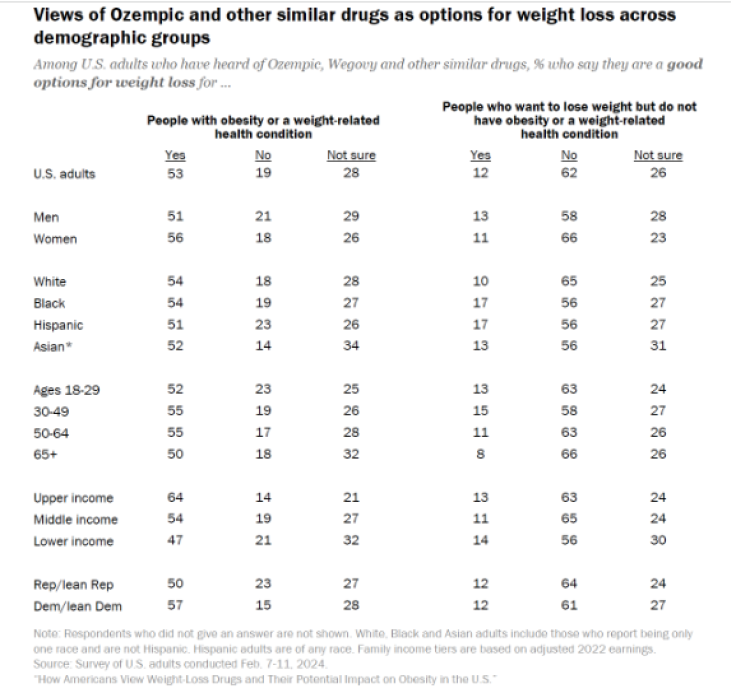
Weight loss drugs have taken over the U.S. by storm, with Ozempic and Wegovy leading the charge. Labeled as "groundbreaking," their effectiveness has been proven and their use skyrocketed.
In this context, the Pew Research Center conducted a survey to illustrate the population's perception of these drugs, as well as their overarching approach to weight loss.
Overall, about three quarters of all respondents say they have heard either a lot or a little about Ozempic, Wegovy and other similar drugs. 20% of Latinos said they had heard a lot about it and 42% that they had heard a little, both figures below the U.S. average (25% a lot and 49% a little). The remaining 38% of Latinos said they had heard nothing at all (the figure being 25% for all U.S. adults.)
In another passage of the survey, respondents were asked whether they believed using these drugs is a good options to lose weights. The answers varied depending on the reason for it.
A little over half (53%) say they believe them to be good options for weight loss for people with obesity or a weight-related health condition. A similar amount of Latinos gave the same answer, with 51%. Moreover, 23% said it wasn't a good alternative for this purpose (compared to 19% of all Americans), while the remaining 26% said they weren't sure (28%) overall.
In turn, the large majority of respondents, Latinos among them, don't believe that the drugs should be used by people who want to lose weight but don't have an obesity or weigh-related health condition. Only 17% of Latinos said they believed it to be a good option (12% overall), while 56% said no and 31% that they weren't sure.
The survey also asked whether people believed that willpower alone is enough to lose weight and keep it off. Here, Latinos' answer differed from the average, as 55% said it's not enough, compared to 65% overall. In turn, 44% said willpower is usually enough, the second highest figure for all demographics surveyed and only behind Asians (46%).
"Among those who describe their weight as very or slightly overweight, 71% say willpower alone is usually not enough for people who are trying to lose weight. Majorities of those who describe their weight as about right (56%) or very or slightly underweight (61%) also take this view, though by somewhat smaller margins," the study added.

Asked about factors impacting on people's weight, respondents put dieting at the top of the list: 57% said it affects weight a great deal while 29% say it does so "quite a bit". "Exercise habits rank second, with 43% saying this impacts a person's weight a great deal and 36% saying it has quite a bit of impact. Three-quarters of Americans say stress and anxiety has at least quite a bit of impact on a person's weight, including 35% who say it has a great deal of impact," according to the Pew Research Center.
According to the CDC, approximately 44.8% of Latino adults live with obesity, the second highest when compared to other ethnic or racial minority groups, the League of United Latin American Citizens (LULAC) explains on its website. Among Hispanic American women, 78.8% are overweight or obesity, it adds.
Several factors contribute to this: lack of access to affordable healthy foods, safe places to exercise/play, stable and affordable housing and access to quality health care and social or cultural attitudes about body weight, among them. Moreover, many Latino families live in "food deserts" and don't have easy access to quality foods, leading them to cheaper and less nutritious alternatives.
© 2024 Latin Times. All rights reserved. Do not reproduce without permission.







